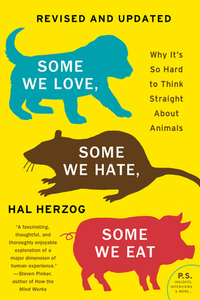Take a photo of a barcode or cover
172 reviews for:
Some We Love, Some We Hate, Some We Eat: Why It's So Hard to Think Straight About Animals
Hal Herzog
172 reviews for:
Some We Love, Some We Hate, Some We Eat: Why It's So Hard to Think Straight About Animals
Hal Herzog
Excellent. This book reminds me of Malcolm Gladwell in that Herzog takes complicated, sometimes boring scientific research about human behavior and animal testing and makes it accessible for the layman. Actually, more than accessible, he makes it interesting. Also, as one of the conflicted folks he discusses (spoiler: you're one of them too) I didn't walk away from this book feeling guilty about eating meat. Recommended for anyone who likes or eats animals or doesn't eat animals. :)
Enjoyable, comprehensive, well organized and connected read. As often happens, it focuses more on the "that" and "how" of our connection to animals than "why".
interessant, mais étrangement vide au final. plein de chiffres et d'anecdotes et pas réellement de quoi décider quoique ce soit
tl;dr version: A good read that forces readers to confront their hypocritical relationships with animals while assuring them that everyone is a hypocrite when it comes to animals. 8/10
For the full review, check out my blog! https://readonbro.tumblr.com/post/169445087544/some-we-love-some-we-hate-some-we-eat-why-its
For the full review, check out my blog! https://readonbro.tumblr.com/post/169445087544/some-we-love-some-we-hate-some-we-eat-why-its
Interesting but not profound. Certainly has some flaws, but by and large, it's an okay book. Wasn't as meaningful as I'd hoped.
If you are looking for a book about vegetarianism, this isn't it. Although it tends to wander in and out of various animal related topics, it's closer to a morality or philosophy book than one that tries to open your mind to animal welfare issues. It was interesting, though not life changing by any means (it's no "Fast Food Nation" type of investigative writing, nor does it claim to be). The author has a lot of expertise in cock fighting, and it shows since he discusses it at length--too much length for me, but he does make interesting points about it. His personal observations and judgments got a little old--he seems to think his readers will inherently agree on all the lines he draws on controversial topics, and he breaks the fourth wall to "talk" to readers in too many "can you believe this guy?" type of asides. But it was worth reading, especially as a vegetarian who beats myself up for not being vegan. It helps you understand human and animal relationships, and might change how you interpret some moral conundrums. But some of the reviews saying it doesn't go far enough one way or the other I think had the wrong expectations (probably set up from the book description claiming this is "paradigm shifting" writing and that the author is similar to Malcolm Gladwell. That's just hyped up marketing talk, for sure. Malcolm Gladwell he ain't.)
If you're going to write a book about what scientific studies can tell us about the relationships between humans and animals, then you should probably reference some of those studies specifically if you want to be taken seriously.
This is a fascinating look at the relationship between humans and animals, focusing primarily on the ethics of human-animal relationships. Herzog examines the various relationships we have with animals: we eat some (but different cultures eat different animals), we keep some as pets (but different cultures and even different people have different ideas about what animals are acceptable pets), we use some for sport (hunting, cock fighting), and we use some for medical experiments. Some people devote their lives to fighting for animal rights.
At the root of all of these interactions are some major ethical questions about what we should and should not do to animals. Why is it okay to eat some and not others? Why is it okay to feed a rat to a snake, but not a kitten? Why do some people keep mice as pets, but then kill mice they find in their kitchens?
Ultimately, our relationship with animals is full of ethical conflicts. If you believe that any animals have rights, then logically those rights must either extend to all animals, or you must deny human rights. There is no logical way to decide what animals have what rights, or whose lives are more valuable than others. Herzog examines how these paradoxes play out in situations like cock fighting and medical research. Ultimately, he concludes that we have to come to terms with the inherent paradoxes in our relationships with animals, and we have to be comfortable with the fact that there is no logically/ethically consistent way to define human/animal relationships.
This makes for some really interesting reading, and requires a lot of soul-searching from the reader.
Really interesting book!! Loved it from start to finish. So informative, full of relevant anecdotes and really forces the reader to question the morality of their own relationship with animals
"Everything is more complicated than you thought." The author, a psychologist who is an anthrozoologist shares a wealth of information from a multitutde of studies and experiences of how people interact with animals. From dolphin therapy - bogus and dangerous - to hunting, animal activism, vegetarianism, pet hoarding, animal research and more, Hal shares interesting and intriguing stories about how we interact with and think about animals. I would never have thought that cock-fighting could be considered humane, but, as Hal explains, the life of a rooster who is pampered, fed a wonderful diet, allowed to live outside, have sex, and lives for two years before being put in a fight is much nicer than that of the chickens that we eat, who only live for 6 weeks in horribly inhumane conditions, never seeing the light of day.
This book definitely makes you think.
This book definitely makes you think.


